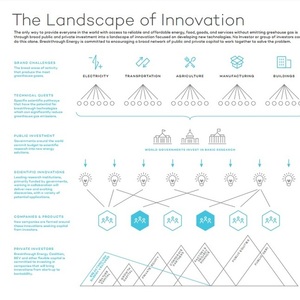BEV to invest $1 billion in clean energy technologies




Breakthrough Energy Coalition
December 12, 2016
BY Erin Krueger
On Dec. 12, members of the Breakthrough Energy Coalition announced plans to invest more than $1 billion in Breakthrough Energy Ventures, an investor-led fund that will finance emerging energy breakthroughs. The fund aims to deliver affordable and reliable energy with the goal of reducing global greenhouse gas (GHG) emissions to near zero. Bill Gates, Richard Branson, Vinod Khosla are among the coalition members, with the BEV composed of 21 investors.
"It is extremely exciting for us to launch this fund as the next step in the commitment made by the Breakthrough Energy Coalition last year," said BEV Chairman Bill Gates. "I am honored to work along with these investors to build on the powerful foundation of public investment in basic research. Our goal is to build companies that will help deliver the next generation of reliable, affordable, and emissions-free energy to the world."
BEV will collaborate with other investors, governments, research institutions and corporate partners, bringing to the table an investor-led fund with internal scientific expertise, a long-term horizon, and a tolerance and understanding of the investment risks required to transform energy markets.
Advertisement
According to information released by the coalition, the mission experience and global networks of BEV investors will allow it to attract the best scientists, entrepreneurs, and private sector exports to guide the fund’s trajectory.
Launching of BEV continues the commitments made by these investors when the BEC was launched last year alongside Mission Innovation, a global initiative of 22 countries and the European Union to accelerate the pace of energy innovations through smart government spending on research and private spending on commercialization.
Advertisement
BEV is designed to have a 20-year lifespan. In addition, the fund will not be confined to any one segment of the investment pipeline. Rather, it can engage in everything from seed and early-stage investments to commercialization. In addition, BEV will consider investments across a variety of sectors, including electricity generation and storage, transportation, industrial system use, agriculture, and energy system efficiency.
The BEC also released its “Landscape of Innovation,” will illustrates the universe of technologies that public and private investors might support in order to move towards a world of zero carbon emissions. Low-GHG liquid biomass-based fuels are among the technologies categorized under the transportation sector.
Additional information is available on the Breakthrough Energy website.
Related Stories
The U.S. Department of Energy Bioenergy Technologies Office (BETO) announced up to $23 million in funding to support research and development (R&D) of domestic chemicals and fuels from biomass and waste resources.
The U.S. DOE has announced its intent to issue funding to support high-impact research and development (R&D) projects in two priority areas: sustainable propane and renewable chemicals and algal system cultivation and preprocessing.
Sens. Sherrod Brown, D-Ohio, and Pete Ricketts, R-Neb., in August introduced the Renewable Chemicals Act, a bill that aims to create a tax credit to support the production of biobased chemicals.
The Chemical Catalysis for Bioenergy Consortium, a consortium of the U.S. DOE’s Bioenergy Technologies Office, has launched an effort that aims to gather community input on the development of new biomass processing facilities.
USDA on March 8 celebrated the second annual National Biobased Products Day, a celebration to raise public awareness of biobased products, their benefits and their contributions to the U.S. economy and rural communities.
Upcoming Events










